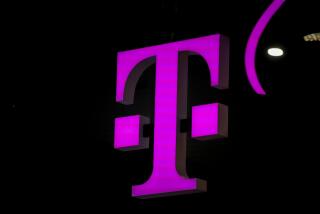Bell Atlantic, Nynex Plan Cellular Merger : Telecommunications: The deal fuels speculation that Airtouch could become a third partner.
- Share via
Bell Atlantic Corp. and Nynex Corp. formally announced Thursday that they will merge their cellular telephone operations--a move that industry executives and analysts said is just the first step in the development of a nationwide wireless communications alliance that may ultimately include Sprint Corp. and California’s Airtouch.
The two big East Coast phone companies said size and broad geographic coverage will be crucial for success in the fast-growing but increasingly competitive wireless communications business. With AT&T; Corp. seeking to buy McCaw Cellular, and MCI Communications allying itself with national wireless service provider Nextel, regional cellular operators will have little choice but to join forces, analysts said.
“You will see consortiums like mad among the regional players,” said Sharon Armbrust, senior analyst at Paul Kagan & Associates, a Carmel, Calif.-based research firm.
If regulators approve--and analysts expect little trouble on that front--the merged cellular operations of Bell Atlantic and Nynex will be worth about $13 billion and cover a region with a population of 55 million, making the new entity the nation’s second-largest cellular service provider behind McCaw. The deal is by far the largest ever between the Baby Bells created by the breakup of AT&T; a decade ago.
But the new cellular behemoth will still be limited largely to the Northeast, and speculation was rife Thursday that Airtouch, recently spun off from Pacific Telesis Group, will soon emerge as a third partner, either through an equity investment or a business alliance.
Airtouch declined to comment specifically on the rumors. “We’ve been talking to companies about partnering to provide a seamless network,” said Amy Damianakes, spokeswoman for Airtouch. Airtouch was set to make an announcement of a wireless deal with Nynex earlier this year but canceled at the last minute for unspecified reasons.
Sprint Corp., the No. 3 long-distance company and the only one without a major wireless alliance, was also cited as a likely partner.
A number of recent developments have accelerated the trend toward consolidation in the cellular business. The House of Representatives on Tuesday passed a communications deregulation bill that includes a provision allowing Bell companies to carry long-distance calls that originate with cellular telephones.
And the Federal Communications Commission later this year will auction off licenses for personal communications services, a new class of wireless services that will supplement and compete with cellular systems. Groups that want to form national wireless networks will need PCS licenses to fill in missing patches in their networks.
“They (the announcements) have cleared the way to make wireless one of the greatest growth markets in the next 10 years,” said Raymond W. Smith, chairman and chief executive of Bell Atlantic.
Paul Kagan & Associates estimates the number of cellular subscribers nationwide will grow to 108 million in 10 years, from 17.5 million today.
Analysts see most wireless providers eventually allying themselves with one of four or five groups, each capable of offering a range of services without the inconvenience of incompatible technologies and roaming charges from region to region.
The push toward national consolidation began last year, when AT&T; announced it would spend $12.6 billion to acquire McCaw.
Although that deal has been hung up in the courts, the Nynex-Bell Atlantic transaction, by creating a powerful new competitor, may have unwittingly strengthened AT&T;’s plea to the Justice Department that it be allowed to complete the merger..
MCI Communications followed earlier this year by spending $1.3 billion for just under 20% of Nextel Communications. Nextel, which uses Motorola technology to offer cellular-like services, says it will be able to cover 180 million people when its full system is in place. The company will also aggressively bid for PCS licenses.
MCI spokesman Kevin Inda said the Bell Atlantic-Nynex merger “validates what we have been saying. It’s very important to deliver a national brand.”
Some industry insiders question how successful the East Coast group will be in building a national network. There are already companies such as Cellular One that offer customers many of the benefits of a national brand. And skeptics say Nynex and Bell Atlantic are a long way from building the end-to-end networking capabilities that would be required to provide a real benefit to customers.






